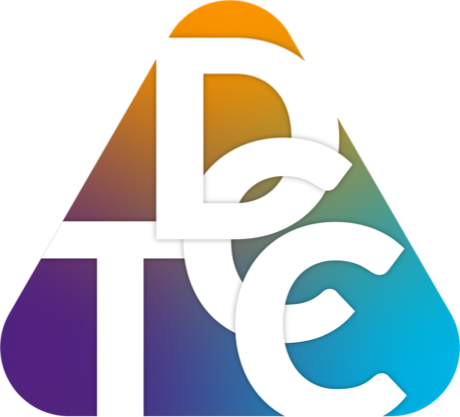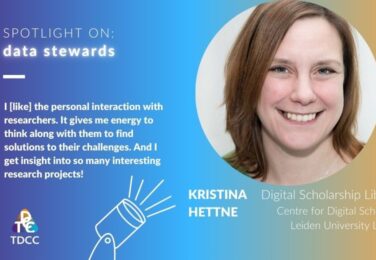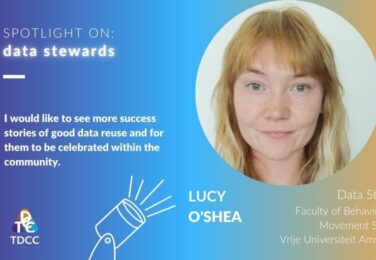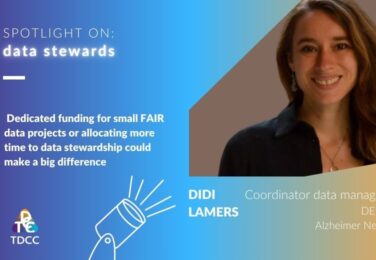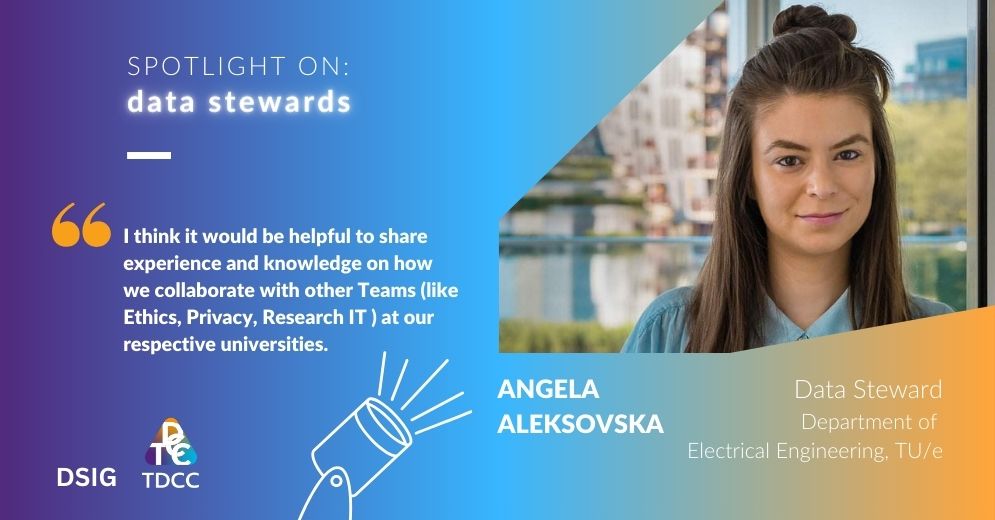
Spotlight on: Angela Aleksovska
Every other week, the Thematic DCCs and the Data Steward Interest Group (DSIG) put the spotlight on one research data steward working in the Netherlands, to stimulate knowledge exchange and peer-to-peer learning.
What drew you towards the research data management field?
Well, I know this might be a cliché unfold where a child follows their parent’s footsteps, but I think a big part of my interest in research in the first place, comes from my mother, who is a scientist herself. So I think she planted a seed of curiosity in me, that I consider a precursor for every good researcher. I ended up studying biochemistry and did my master's studies in Macedonia where I come from. In a developing country where resources for science are scarce (but motivation and drive aren’t) I have faced inequalities in accessing knowledge, equipment and data. I remember days when the only way to get data from a publication, was to contact the authors and ask them for it.
Later on, I was privileged to do my PhD in chemistry, in Leipzig, Germany, where I found a whole new world of possibilities and opportunities for research. However, the pressure of the “publish or perish” and “funding or famine” culture and climbing the ladder of metrics and benchmarks (citations, impact factors etc.), started to have a detrimental effect on my intrinsic drive as a researcher. I was happy to find a role close to research, but not having to do the research myself. So, given the background, it is plain to see how I got attracted to the FAIR principles and open data as concepts to make science more openly available and make knowledge more equitable and accessible. During my training, I remember reading stuff like the “Berlin Declaration of Open Access” and “DORA-The San Francisco Declaration of Research Assessment” and thinking to myself: “Let’s go for this!”
What is an activity/task of your role that you find yourself looking forward to?
I do like the diversity of the job and the wide range of activities, and I think the “ever-changing landscape” of research data management will continue to be an indispensable part of research. But what I find myself really looking forward to, is our engagement in Ethics and Privacy in AI. As AI becomes more impactful, ethics in AI becomes increasingly important. As a part of a technical university, I believe it is really important that technologists have this mantra of ensuring that their innovation is ethical and beneficial to society. I am all up for advancements in technology and I think this generation will live to see the transformative effects of AI in our lives, but there is also space for contribution to ensuring moral principles and human dignity are maintained and vulnerable individuals are protected. I think Research Data Stewards can serve an important role in the initial part or planning of such research.
What is something unexpected that you can offer help with, if a colleague reaches out to you?
I am embedded at the Department of Electrical Engineering and with that I am involved in a lot of RDM aspects of the Eindhoven MedTech Innovation Center (that involves TU/e, Catharine Hospital, Maxima Medical Center, Kempenhaeghe Epilepsy and Sleep Center and Philips) where researchers do really meaningful and impactful high-tech health care innovations. So, I tend to learn more about protecting and handling health data, and the processes around the Innovation Center that involve, sharing, using and processing of these data. Identifying possible risks to processing health data in the light of new technological developments and also finding plausible ways how to address these risks, while still being able to use the data and make it beneficial for the PhD candidates and researchers in general, has become a part of my daily operations.
What do you think your community of research data professionals is missing?
I think in the Netherlands there are enough platforms to connect with research data professionals and I believe the level of awareness of RDM is ahead of other countries in Europe. We might just need more time from our daily schedules to connect, share knowledge and brainstorm. It might be beneficial to also use these platforms and create a knowledge base of testimonials from researchers of how topics like RDM and FAIR have helped accelerate the impact of their research, make it more collaborative and make it less susceptible to loss. We could then potentially use these in our training and raising awareness programs to build trust and credibility. I think it would also be helpful or even eye-opening to have a discussion and share experiences and knowledge on how we collaborate with other Teams (like Ethics, Privacy, Research IT and other support staff) at our respective universities.
What is a topic you would want to collaborate on with others?
Honestly, I am ready to collaborate on any topic that brings value to the researchers. However, I am particularly interested in health-data related RDM practices and RDM, Ethics and Privacy in AI.
How would you like to see your current field of work evolve in the next 5 years?
Clearly, according to funder requirements and in general raising awareness, open science and open data are only going to become more prominent with time. Therefore, researchers’ need for support from skilled staff in addressing these topics will likely continue to increase in the coming years. I assume training researchers to be more receptive to RDM practices and using RDM as a cornerstone of a successful research project, will also continue being an important part of our tasks. That being said, there’s a clear need for better-defined discipline-specific research data management practices and I hope we will be able to address these in future. I can also see how AI can open new horizons, involving topics like RDM for AI research, but also how AI can improve RDM. Overall, I think the research data landscape is evolving at an unprecedented pace and with that, we should expect that our roles will too. Exciting… and slightly scary 😊
Get in touch with Angela: LinkedIn profile
Do you want to read other interviews published in the Spotlight on series? Visit the series' page.
Are you a data steward or data professional who wants to be featured in one of the future editions? Fill out this form.
